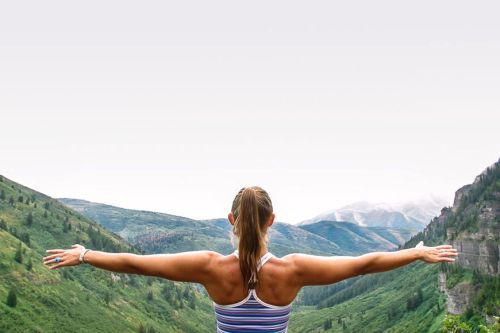Please don’t call me “butch” just because my arms look strong
The words we use to describe things matter. One writer sounds off on why using an LGBTQ term incorrectly is offensive.

As a rugby player turned CrossFit athlete, I’ve been called many things—powerful, jacked, athletic, intimidating, muscular, bulky—because I look strong. And usually, I appreciate the acknowledgement of the hard work I’ve put in at the gym, the box, and on the rugby pitch. But there’s one word that occasionally gets slung around that I’m sensitive to. That word is butch.
The first time I heard the term, I was in eighth grade. It was a few weeks into the school year, and our usual science teacher was replaced by a substitute. When she walked in the door, one of the well-groomed boys sitting in front of me leaned over the desk to whisper-shout, “Look at that loser butch!”
I don’t remember if the teacher heard him and the pain of his ignorance registered on her face, or if she got right to introducing herself to the class. But I remember being confused: What exactly was a butch? And why did this boy say it with such a condescending sneer?
“There are no such things as gay or straight bodies. Or male or female workouts. Or masculine or feminine levels of muscle. Sexuality and gender don’t have a specific look.” —Courtney Cleman, founder of The V. Club
When I asked a classmate later what it meant, she told me it was a word for a woman who looked like a man. “It’s like Ellen Degeneres, but more man-like,” she said. I remember thinking, That can’t be good if it’s being used with that tone…
Now, decades later, I know that both the bratty boy’s dig and my friend’s definition of butch were both harmful stereotypes. But, while I identify as queer and I’ve had lovers and friends who have embraced the term butch, that particular word is still a sticking point for me. Often I hear “you’re looking rather butch, these days,” while someone squeezes the breadth of my arms, and it takes me right back to that moment in middle school.
“Labels are tricky. They can be dangerous. They can hurtful. Especially when they’re assigned to us, as opposed to something we name ourselves,” says Courtney Cleman, CFA and co-founder of The V. Club, a wellness center in New York City where women can take empowering classes and receive community support for topics pertaining to relationships, sex, and wellness.
The reason, she says, is that sexuality doesn’t look a certain way. “There are no such things as gay or straight bodies. Or male or female workouts. Or masculine or feminine levels of muscle. Sexuality and gender don’t have a specific look,” Cleman says.
When a word is used describe someone who doesn’t identify that way, it’s being used wrong.
At the same time as our culture has started rethinking the boxes we put around gender and sexuality, the body positivity movement has reminded us that women’s bods are badass because their owners are, not because they’re shaped a certain way. “And it’s shifted the scope of what women can look like,” says Cleman. “We’re seeing more women than ever before build their bodies up. We’re seeing more women making their bodies bigger, with muscle,” she says. “The *now* that we’re moving towards lets people be who they are, look how they look, and name their identities for themselves.”
I present as athletic, may not look traditionally feminine (my beauty routine is minimalist by even minimalist standards, and my gait lacks grace), and I do identify as gay or queer. But please don’t call me butch—not because it’s a dirty word (it’s not!) but because that term just doesn’t dovetail with my experience. And when a word is used describe someone who doesn’t identify that way, it’s being used wrong. The reason we don’t call avocados “peaches” isn’t because peaches are bad, it’s because they’re a different fruit.
“The words and phrases that we use to name and call things matters,” says Cleman. “Of course, that crosses over into the fitness world and the phrases used to describe bodies,” she says.
My understanding of of the term butch will likely continue to evolve. And maybe one day I won’t bristle when the word—which has historically been used to tell me that what I feel and who I am is unnatural or wrong—is used to describe my body. But I’m not there yet.
So for now, I’m going to continue reaping the benefits of strength training, and if you want to comment on my body, tell me that you’re impressed by how sculpted my shoulders are. Ask me how I got so powerful. Ask me to flex, even. But don’t call me butch just because my arms look strong.
While we’re on the subject of words, see how the term “yoga body” is being redefined. Plus, Kayla Itsines sounds off on the meaning of “bikini body.”
Sign Up for Our Daily Newsletter
Get all the latest in wellness, trends, food, fitness, beauty, and more delivered right to your inbox.
Got it, you've been added to our email list.








